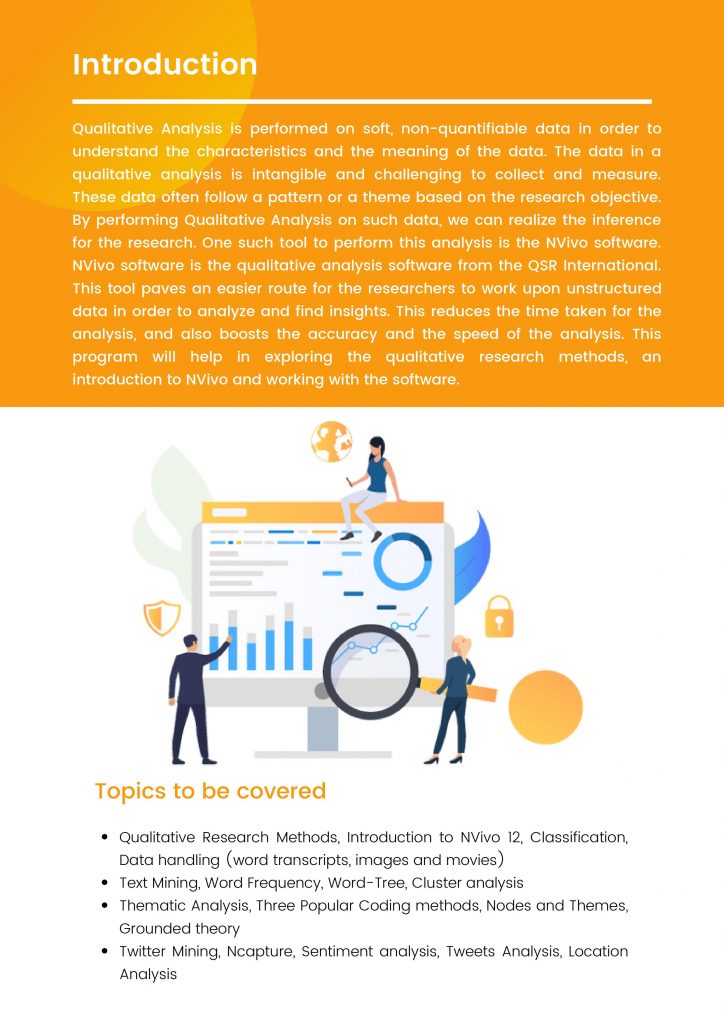We had a session on faculty development program 2022 where our speaker was Dr. Ajay Kumar Chauhan, UBS, Mumbai, Director FPM.
Topics covered include:
Methods of Qualitative Research, NVivo 12:
- An Introduction Data classification and management (word transcripts, images and movies)
- Word Frequency, Word-Tree, Text Mining Analyze clusters
- Nodes and Themes, Thematic Analysis, Three Popular Coding Methods Theoretical foundations
- Ncapture, Twitter mining, sentiment analysis, tweet analysis, and location analysis
Objective:
- To comprehend the significance of qualitative analysis in research and how it might be applied by academics.
- Learn how to use the NVivo programme for Qualitative Analysis and put it to use in research.
Introduction:
Dr Sheetal Mahendher, Professor and Research Chair, ISBR Business School, spearheaded the Professors Development Program with Dr Y Lakshman Kumar, Director, ISBR Business School, in order to upskill faculty and research scholars with contemporary trends. This session took place at 9 a.m. on February 5, 2022. “Qualitative Analysis Using NVivo” is the workshop’s theme. Dr. Ajay Kumar Chauhan, a well-known expert, facilitated this programme for the numerous attendees who had registered. This event took place entirely online using the ZOOM platform. The presentation began with Dr. Sheetal Mahendher introducing the guest to the participants.
Discussion and takeaways: Dr. Chauhan gave an overview of what goes into qualitative research and how to approach it. He also talked about the several kinds of unstructured data that could be used in the study. Then he presented a quick overview of the NVivo app to the audience. He showed the attendees how to use the software for amateurs and navigate through it. His way of explaining the software was simple enough for a layperson to grasp. He then demonstrated how to upload various types of datasets into the programme to the audience. He also demonstrated how to use videos and films as a dataset.

The next step was to import data from social media, which has been an important aspect of our research in recent years. He demonstrated how to extract bitcoin data from Twitter, then import and add the data to NVivo using NCapture. He also demonstrated how to use YouTube data. He demonstrated how to create a global cloud using the imported dataset using Run Query in a variety of forms.
The word cloud’s unnecessary words can also be modified and erased, after which it repeats and displays the revised version. He also explained how to use the tools to code. We’ll need to choose the data, click Auto Code, and then select Identify Sentiment.
He also demonstrated how the analysis was done by showing “Rahul Gandhi on Twitter,” a Scopus piece based on research papers. He discussed topic analysis and demonstrated how to write a research chapter. He emphasised the importance of themes in study. Reading the transcript, identifying broad themes, conversing with specialists, and reporting are all necessary steps in the theme-finding process. He explained how theme analysis is a time-consuming procedure that necessitates patience while conducting company profiling. The benefit of this thematic analysis is that it may be done when academicians are necessary to read a large number of papers and books in order to identify keywords. Files and references are also provided by software.
He discussed the necessity of research for professors and how qualitative research, such as NVivo, may help them with it.
Dr. Sheetal Mahendher gave a vote of gratitude to the speaker, which brought the session to a close. This seminar was extremely beneficial to academics, research scientists, and students who wanted to learn more about qualitative analysis and how to use NVivo software to do it. It also explained the fundamentals of the NVivo programme and how to use it to diverse research goals.

